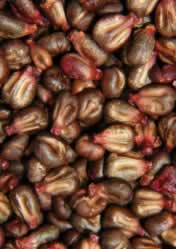Health Benefits of Grape Seed Extract to Type 2 Diabetes Conditions.
In a published report in Diabetes Medical Journal of 2009 May entitled “Effects of grape seed extract in Type 2 diabetic subjects at high cardiovascular risk: a double blind randomized placebo controlled trial examining metabolic markers, vascular tone, inflammation, oxidative stress and insulin sensitivity.” The researchers from Queen Alexandria Hospital in United Kingdom reported that grape seed extracts significantly improved markers of inflammation and glycaemia and a sole marker of oxidative stress in obese Type 2 diabetic subjects at high risk of cardiovascular events over a 4-week period, which suggests that grape seed extracts may have therapeutic benefits in decreasing cardiovascular risk.
Grape Seed Extract Benefits for Breast Cancer
Researchers from The Department of Surgical Research, Beckman Research Institute of the City of Hope, Duarte California, USA, as published in the Journal of Cancer Research, June 2006 has reported that grape seed extract is an aromatase inhibitor and a suppressor of aromatase expression. Aromatase is the enzyme that converts androgen to estrogen and it is expressed at higher levels in breast cancer tissues than normal breast tissues. Grape seed extract contains high levels of procyanidin dimers that have been shown in laboratory to be potent inhibitors of aromatase. This report suggested that grape seed extract has potential benefits in the prevention/treatment of hormone-dependent breast cancer through the inhibition of aromatase activity as well as its expression.
Grape Seed Extract Benefits Nonalcoholic Liver Disease.
In a report from Saudi Journal of Gastroenterology, grape seed extract has been found to improve liver function in patients with nonalcoholic fatty liver change. In a three month clinical studies, 15 patients with nonalcoholic liver disease were administered with grape seed extracts. The study suggested that grape seed extract significantly improved the grade of fatty liver change; and resulted in significant decrease in alanine aminotransferase in patients receiving the concentrate compared to those receiving vitamin C independently. The study describes the benefits of using grape seed extract for three months in patients with nonalcoholic fatty liver disease.
Grape Seed Extract Has Benefits for Neurodegenerative Diseases
In a NCCAM funded research done at Mount Sinai School of Medicine, it was found that grape seed extract containing polyphenols may inhibit the misfolding of proteins in the brains that is linked to various neurodegenerative conditions including Alzheimer’s disease. The results of their in vitro study showed that grape seed extract is capable of interfering with the generation of tau protein aggregates and also disassociating preformed aggregates, suggesting that grape seed extract may have beneficial effects to processes critical to the progression and onset of cognitive dysfunctions and neurodegeneration. The research concluded that grape seed extract is likely to be safe and well-tolerated in people, and may offer benefits as alternative therapy for Alzheimer’s disease.
Grape Seed Extract has Benefits for Cardiovascular System.
In a review study done in Yale School of Medicine, New Haven CT, USA and published in the Journal of American Dietetic Association 2011 August, entitled “The effect of grape seed extract on cardiovascular risk markers: a meta-analysis of randomized controlled trials.” It was reported that grape seed extract has beneficial effects on the cardiovascular system. Based on the currently available and reviewed literature, grape seed extract appears to significantly lower systolic blood pressure and heart rate, with no effect on lipid or C-reactive protein levels. Although it is suggested that larger randomized, double-blinded trials evaluating different dosages of grape seed extract and for longer follow-up durations are needed.
Grape Seed Extract has Benefits for Platelet-dependent Antithrombotic and Anti-inflammatory properties
In as research study done in Whitaker Cardiovascular Institute and Evans Department of Medicine, Boston University School of Medicine, Boston, Massachusetts, USA. and was published in the Journal of Cardiovascular Pharmacology 2005 Oct, reported that grape seed and skin extracts inhibit platelet function and release of reactive oxygen intermediates. Grape seed extract contain polymeric flavonoids with antioxidant properties believed to be protective against cardiovascular events. Acute cardiac events are also associated with enhanced inflammation and thrombosis. In this study, the extracts from grape skins or seeds were examined for their anti-inflammatory properties and effect on platelet release of reactive oxygen intermediates. The results suggests that the extracts from purple grape skins and seeds inhibit platelet function and platelet-dependent inflammatory responses at pharmacologically relevant concentrations. These findings suggest potential benefits for platelet-dependent antithrombotic and anti-inflammatory properties.
Grape Seed Extract Benefits Dermal wound healing of redox-active grape seed proanthocyanidins
In a laboratory research done in the Department of Surgery, Heart and Lung Research Institute, The Ohio State University Medical Center, Columbus, OH, USA found that topical application of grape seed extract accelerated wound contraction and closure. Grape seed extract treatment was associated with a more well-defined hyperproliferative epithelial region, higher cell density, enhanced deposition of connective tissue, and improved histological architecture. The study suggests that there are firm evidence to support that topical application of grape seed extract represents a feasible and productive approach to support dermal wound healing.
Grape Seed Extract Benefits Osteoporosis by enhancing Bone Density and Strength in Experimental Animals
In the Journal of Musculoskeletal Neuronal Interactions 2005, a research was published studying the mechanical assessment of effects of grape seed proanthocyanidins extract on tibial bone diaphysis in rats. The research was done in the Department of Paediatric Dentistry, Kyushu Dental College, Manazuru, Kokurakita-ku, Kitakyushu, Japan.
The report presented data from a 6-week experimental period that showed the tibial cortical parameters were increased by grape seed extract treatment, suggesting a potential herapeutic application of this compound for treatment of bone debility.
Grape seed proanthocyanidines and skin cancer prevention: Inhibition of oxidative stress and protection of immune system
In a study reported in Molecular Nutrition and Food Research June 2008, suggested that the in vitro and in vivo studies of the possible protective effect of grape seed proanthocyanidins and the molecular mechanism for these effects in SKH-1 hairless mice produced a decreased UVB-induced skin tumor development in terms of tumor incidence, tumor multiplicity, and a decrease in the malignant transformation of papillomas to carcinomas. This study suggests that dietary grape seed extract supplementation could be useful in the attenuation of the adverse UV-induced health effects in human skin.
Hepatoprotection Benefits of Grape Seed Extract
In Toxicology and Applied Pharmacology. 2011 Aug, a report has been made that grape seed extract inhibited arsenic-induced rat liver injury through suppression of NADPH oxidase and TGF-β/Smad activation. The study was made in Public Health College, Zhengzhou University, 450001, China. The report discussed that chronic arsenic exposure induces oxidative damage to liver leading to liver fibrosis. From the in vitro study, grape seed extract dose-dependently reduced arsenic-stimulated ROS production and NADPH oxidase activities.
Antiviral Activity of Grape Seed Extract
In Biology Research. 2002, it was reported that grape seed extract proanthocyanidins down regulate HIV-1 entry coreceptors, CCR2b, CCR3 and CCR5 gene expression by normal peripheral blood mononuclear cells. The study was made in the Departments of Medicine and Microbiology, Kaleida Health System, Buffalo General Hospital, Buffalo, NY, USA. It was suggested that the flavonoids and related polyphenols found in grape seed extract, in addition to their cardioprotective, anti-tumor, anti-inflammatory, anti-carcinogenic and anti-allergic activities, also possess promising anti-HIV effects.

 Scientific Name: Vitis Vinifera
Scientific Name: Vitis Vinifera Grape seed extract may also be found in cosmetic lotions and ointments. You just have to look for it in the labels.
Grape seed extract may also be found in cosmetic lotions and ointments. You just have to look for it in the labels.

